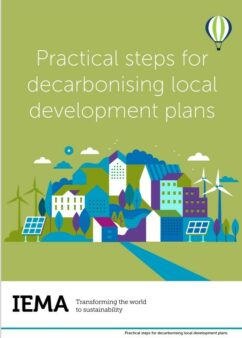New guidance launched to help local authorities on their journey to net zero
IEMA has produced a new toolkit for local authorities: Practical steps for decarbonising local plans. Project lead Chloë Fiddy explains why this guidance is both timely and needed.
Around a third of the UK’s emissions are dependent on sectors that are directly shaped or influenced by local authorities.1 In response most local authorities have declared climate emergencies and are developing strategies and action plans to deliver ambitious targets for net zero. Often these targets are as near as 2030 and as ambitious as aiming for net zero for their whole areas.
Climate action plans tend to focus on reducing or removing existing emissions. Multiple building owners make it difficult to deliver energy-efficient retrofit projects. Highways land is given over to carbon and pollution-intensive private cars, making it physically and culturally difficult to carve space back out for zero-carbon cyclists and pedestrians. New developments tend to perpetuate these problems.
Local development plans are almost always in work, the statutory cycle requiring up-to-date plans being in place, and reviewed every few years. Almost as soon as a plan is completed, planning policy officers need to begin the review. Planning policy takes climate change into account, along with many other considerations, but it isn’t the sole focus.
Despite these two workstreams happening simultaneously in most local authorities, there is no guidance on incorporating the two. Planners may be unwittingly contributing to future workloads of climate officers, by planning for buildings and infrastructure that will need future re-design. Meanwhile climate officers may be failing to spot opportunities to decarbonise their areas in collaboration with development opportunities.
While any development will cause emissions growth, there are opportunities to mitigate this by taking climate change and energy use into greater consideration during the planning process. The best way to do this is by creating improved evidence bases for policies that address climate change in the future built environment.
This toolkit has been put together to help close the gaps between climate action plans and the planning process, and to improve the plan’s evidence base. IEMA’s climate change and energy policy steering group has worked with IEMA members in the planning and infrastructure emissions fields to create a simple set of stages for local authorities to follow.
- Stage one provides a clear understanding of baseline emissions and future carbon budgets.
- Stage two shows simple steps for calculating emissions linked to alternative policy options.
- Step three describes how the monitoring process feeds back into the review.
Critically, the toolkit shows how each of the stages interacts with the authority’s climate action plan.
The toolkit is available to members as an interactive document or as a page-by-page PDF here.
Non-IEMA members can purchase this toolkit here, under 'Sustainability in Practice Guides'.
Following this launch stage, IEMA will be working with local authorities to road-test the toolkit. If your local authority in interested in participating in this trial, please do get in touch: [email protected].
Subscribe
Subscribe to IEMA's newsletters to receive timely articles, expert opinions, event announcements, and much more, directly in your inbox.
